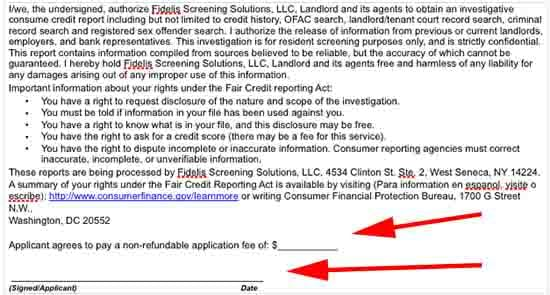
Updated June 2023
Tenant screening can be a bit complex in certain states across the country, and New Jersey is one of those states. Knowing how to screen in New Jersey will help landlords, like you pick tenants who are the best fit for your rental properties. Today we will cover some of the most important topics that relate to New Jersey Tenant Screening, such as:
- New Jersey tenant screening laws
- Fair Chance in Housing Act (FCHA)
- Lots of free resources for landlords
- The screening process overview for New Jersey
- How to choose a tenant screening service
New Jersey Tenant Screening Laws
The laws in New Jersey often differ from other states when it comes to how landlords screen applicants.
For example, you should be aware of these as a New Jersey landlord.
- The state of New Jersey puts no restrictions on the amount that a landlord can charge for an application fee
- Landlords in New Jersey can charge a maximum security deposit up to one and a half times the monthly rent
- The application fee (non-refundable) and the security deposit (refundable) are separate payments and are not the same thing
Many applicants are unaware that an application fee is different from a security deposit, so it makes sense to take the time to explain it to applicants. Of course, if you decide to refund the application fee for some reason, you can do that.
Don’t Make This Screening Mistake
If you are running a background check on all your applicants, it is important to remember that you can only do so if you have a signed consent form from the applicant.
Make sure your rental application form has a section that requests signed consent from the applicant. Otherwise, you won’t be able to run a background check and find out important information.
Here’s an example of the language we use on our forms here at RentPrep.
The top arrow emphasizes that the application fee is non-refundable. Many applicants get confused with application fees and security deposits and other fees.
The bottom arrow indicates where the applicant is to sign to give consent to run a background check.
Fair Chance in Housing Act for New Jersey Landlords
The Fair Chance in Housing Act (FCHA) was signed into law by Governor Murphy in June, 2021. This act bars landlords from asking applicants about their criminal history on rental application materials, in an interview, or in any other way before making an offer. The purpose of the FCHA is to ensure that people with past criminal history get a fair shot at accessing safe and affordable housing. It is also unlawful for a landlord to state in any advertisement that they are prohibiting applicants with criminal histories from applying to a place of residence. This law also prohibits a landlord from requiring any drug or alcohol tests prior to applying for the residence or being accepted. The only two exceptions to this law are:
- Whether or not an applicant has ever been convicted of a drug-related crime for the production or manufacture of methamphetamine on the premises of a federally assisted housing.
- Whether or not the applicant is subject to a lifetime registration requirement on a state sex offender registry.
A landlord in New Jersey may never, either before or after the issuance of an offer, ask about the following types of criminal records, or rely upon these records in rejecting an applicant (no matter how this information is obtained):
- Arrests or charges that have not resulted in a criminal conviction;
- Expunged convictions;
- Convictions erased through an executive pardon;
- Vacated and otherwise legally nullified convictions;
- Juvenile adjudications of delinquency;
- Records that have been sealed
Resources For Tenant Screening In New Jersey:
Here are some free forms and resources to help you find the best possible tenant for your rental.
- Move-In Move-Out checklist – This is helpful for after the tenant screening process to make sure you document the condition of the rental.
- Summary of Your Rights Under the FCRA – Our screeners here at RentPrep are FCRA certified to ensure compliance on your screening report.
- New Jersey Tenants Guide – Everything a New Jersey landlord needs to know.
- 20 Questions to Ask Potential Tenants – Top questions to ask your potential tenants
*Don’t forget the “No Blank Space” policy. This is when you don’t accept any applications with blank spaces or areas that aren’t filled out. Often, applicants with a shady rental history will leave out important information. By only accepting applications that are completely filled out can you get the best screening results.
New Jersey Tenant Screening Process
Successful landlords create screening criteria for each rental property. The criteria consist of the conditions you want to see in your tenant. Once you have a final list, write it down for future reference.
Not sure about what to put on your list? Some common criteria include:
- No past evictions
- No bankruptcies
- Pet limits (weight, breed, how many, etc.)
- Income to rent ratio (such as monthly income that is three times the rent)
- No judgments/liens
It’s important to keep your screening criteria legal, that is, don’t ever discriminate against a protected class, as outlined by hud.gov.
When your screening list is final, make sure to stick to it when making your decisions about rental applicants. As long as you don’t deviate, you will be protecting yourself from any kind of discrimination lawsuit from a denied applicant.
If you are not consistent in screening tenants, it could look like you’re discriminating. Take the time upfront to list the criteria, so you won’t have to make on-the-spot decisions or go with your gut instinct. Avoid legal trouble by sticking to your list!
Above all, take the time to learn the New Jersey tenant screening process. You may think you know all about it, but there are some different aspects to keep in mind.
- Application fees are not refundable, meaning you can keep the money to cover the cost of screening
- Make sure that every applicant knows that their fee is not refundable, whether they are selected or not
- Some landlords return the application fee to the applicant they choose, but it is not required by law
Get all the details in this informative guide that gives more insights specific to New Jersey.
Finding The Right Screening Service
After you’ve chosen the best of the best in rental applicants, it’s time to run a background check.
To get the most out of a proper background check, you’ll need info on the following items:
- Eviction history
- Bankruptcy search
- Judgments/liens
- Address history
- Criminal history
Never rent to a tenant based on your emotions–use hard data instead. If you choose not to do a background check, you won’t be able to know what kind of tenant they will be, until it’s too late.
Here at RentPrep we’ve helped more than 21,000 landlords over the past decade.
Check out our tenant screening packages to see the services we offer.
Our FCRA certified screeners know what to do to ensure that you’ll get the best tenant screening report available.


